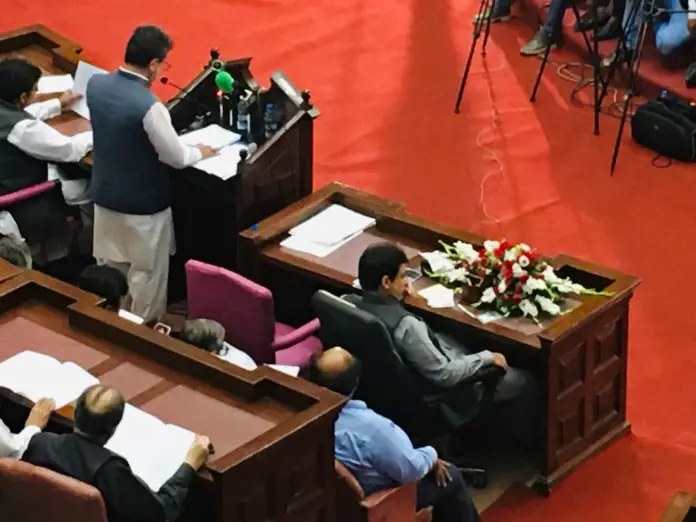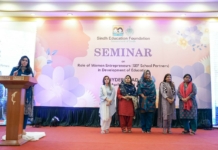
By Samiullah Randhawa and Hassaan Ahmed
Amidst political chaos seen in the province during the past few days, which saw the authorities postponing the budget session twice and holding two parallel sessions on Wednesday, the Punjab government finally succeeded in presenting the finance bill for the next fiscal year with a total outlay of Rs3.226 trillion, and earmarking a whopping Rs685 billion for development programmes focusing on projects of road infrastructure and social sector.
Instead of the Punjab Assembly, the new Punjab government of the Pakistan Muslim League-Nawaz (PML-N) presented its first budget at Aiwan-e-Iqbal, in which it proposed no new tax under the sales tax on services for fiscal year 2022-23.
According to Sardar Awais Leghari’s budget speech, the Punjab government estimated its total revenue collection at Rs2.521 trillion, of which Rs2.020 trillion are estimated to come from the federation divisible pool, and provincial receipts are estimated at Rs500 billion, which is 24 per cent higher than the preceding year’s Rs405 billion.
Under its revenue generation targets, the Punjab Revenue Authority (PRA) has been tasked with collecting Rs190 billion with an increase of 22 per cent, the Board of Revenue will collect Rs95 billion with an increase of 44 per cent, and the Excise and Taxation Department will collect Rs43.50 billion with an increase of 2 per cent, while Rs163 billion is expected to be collected from non-tax revenue.
Among its total allocation of the development budget, at least 40 per cent is proposed for the social sector, 24 per cent for infrastructure, 6 per cent for the production sector and 2 per cent for the services sector. It has been proposed to allocate 28 per cent of the budget for other programmes and special initiatives.
According to the budget documents, Rs365 billion has been proposed in the development budget for schemes already underway, while allocation of Rs234 billion has been proposed for new schemes. Likewise, Rs41 billion is proposed for other development schemes and Rs45 billion for public-private partnership.
Under the development programme, Rs272.6 billion was proposed for the social sector, of which Rs172.5 billion has been proposed for health and Rs56billion for education sectors.
Funds of Rs164 billion has been proposed for infrastructure development, including Rs80.8 billion for road sector. Also, Rs35 billion will be spent on road maintenance and rehabilitation programme. As many as 149 new schemes have been proposed in the new budget.
Of the total volume of the budget, Rs1.712 trillion has been allocated for current expenditure. A heft amount of Rs435.87 billion has been earmarked for salaries in the next financial year, and Rs312 billion will go in terms of pensions.
According to the budget documents, Rs428.56 billion is proposed in the total budget allocated for education sector under which Rs39 billion has been set aside as development funds.
Out of Rs382 billion of the current budget for school education, the government proposed Rs5.53 billion for the Zewar-i-Taleem programme to give scholarships to 600,000 female students, Rs3.2 billion to provide free textbooks to schools, Rs14.93 billion for school councils and Rs3.75 billion for the current expenditure of Daanish schools.
Also, Rs21.5 billion has been earmarked for Punjab Education Foundation, Rs4.80 billion for Punjab Education Initiative Management Authority (PEIMA) and Rs1.50 billion for the dilapidated school buildings.
Another Rs59.07 billion has been proposed for Higher Education Department out of which Rs13.50 billion has been proposed as development budget.
In the overall budget, it is proposed to allocate Rs485.26 billion for the health sector with an allocation of Rs296billion for non-development and Rs174billion for development expenditures. Under the development allocation, Rs21 billion has been proposed for primary and secondary healthcare; Rs3.1 billion for the revamping of THQ and DHQ hospitals; Rs4.2 billion for skill development programme and Rs0.5 billion for Punjab Urban Land Systems Enhancement.
A proposal of 15 per cent increase in salaries of public departments’ employees was made in budget speech while a 15 per cent disparity allowance was also proposed for the employees of certain departments. For the agriculture sector, the Punjab government has proposed to allocate Rs53 billion, of which at least Rs15 billion will be for development projects. The government proposed Rs1.27 billion for the Women Development Department, while it earmarked Rs2.5 billion for the protection of minorities. It also proposed developing a Minority Development Fund worth Rs1.35 billion under this allotment. The Punjab government proposed increasing the minimum salary from Rs20,000 to Rs25,000.
It decided not to levy new tax on sales tax on services for the next financial year to facilitate small businesses. It has been proposed to increase the rate of stamp duty from 1 per cent to 2 per cent. In budget documents, the government proposed introducing new rates on luxury homes by amending the Finance Act 2014. Also, Rs528 billion has been allocated for local governments.
Parallel sessions
It was an unusual day in the parliamentary history of Punjab, as two parallel assembly sessions were held on the same day. A session was chaired by Speaker Ch Parvez Elahi at the Punjab Assembly, while the other session was chaired by Deputy Speaker Sardar Dost Muhammad Mazari at Aiwan-e-Iqbal. Only the MPAs of opposition attended the session held at the Punjab Assembly, while the session at Aiwan-e-Iqbal was only attended by the treasury lawmakers. The Pakistan Tehreek-e-Insaf (PTI) has hinted at move a petition in the court against the session held at Aiwan-e-Iqbal.
It all started when the Punjab government convened the session to present the budget for fiscal year 2022-23. Speaker Parvez Elahi made conditional the presentation of budget to the presence of Punjab Police inspector general (IG) and the chief secretary in the House. The speaker gave a ruling on Monday that both the IG and the chief secretary would have to tender an apology in the House for the crackdown on PTI MPAs.
Multiple rounds of talks were held between the government and opposition that day but the deadlock persisted. The government and the Chief Minister had to face severe humiliation at the hands of the speaker and PTI lawmakers. The deadlock continued on Tuesday as both the parties refused to budge from their stance.
The government started weighing different options and then decided to prorogue the existing 40th session, while also calling a fresh session at some other place where there would be no hindrance by Parvez Elahi in presenting the budget.
The office of the governor was smartly used by the government to pave the way for presenting the provincial budget. The governor first prorogued the existing session and summoned a fresh session. Later, an ordinance was issued by the governor through which the Punjab Assembly was made a subordinate institution of the Law Department.
The powers of the speaker and Punjab Assembly secretary were also curtailed through this ordinance. Now, the law secretary will be the big boss of Punjab Assembly, as he will issue the summoning and prorogation orders of the sessions. The Punjab Assembly staff members were left confused, as they were discussing where to go in this situation, as they were directed by law secretary to reach Aiwan-e-Iqbal. In this situation, the staff was also scared of Parvez Elahi’s action if they would leave for Aiwan-e-Iqbal. A senior officer of the rank of special secretary was seen at Aiwan-e-Iqbal too, while the duties of the assembly secretary were performed by the Law secretary.
Elahi reached the Punjab Assembly and chaired the parliamentary party meeting of PTI and PML-Q. Later, he came to the House to chair the session. The Panel of Chairmen was also announced that showed that he admitted it as a fresh session. The Panel of Chairmen is a panel comprising four MPAs who preside the sitting in the absence of both the speaker and the deputy speaker and it is announced on the first day of a session. Later, the speaker said that he summoned the session on the requisition of the opposition.
Earlier, Elahi had refused to accept the prorogation of the 40th session. During the proceedings, a privilege motion was moved against provincial minister Attaullah Tarar for his indecent gesture of hand. The motion was moved by PTI leader Dr Yasmin Rashid, through which she demanded a lifetime ban on Tarar from entering the Punjab Assembly. The motion was referred to the standing committee and the speaker sought a report within two months. Later, the MPAs of opposition also passed a resolution against the curtailing of powers of the Punjab Assembly. Elahi then adjourned the sitting until today (Thursday) at 1pm. Meanwhile, the other session was postponed until Saturday.






